Exit your timeshare with Hilton Hotels

Is It Time to Exit Your Hilton Timeshare? Here’s What You Need to Know
Purchasing a Hilton Grand Vacations (HGV) timeshare might have seemed like a great idea at the time—luxurious stays, guaranteed vacations, and a world-class brand backing your investment. However, for many owners, the reality of ownership comes with challenges such as rising maintenance fees, booking difficulties, and high-pressure sales tactics. If you’re feeling trapped in your timeshare agreement, you’re certainly not alone.
Let’s dive into the details of Hilton Hotels’ timeshare program and why so many owners are looking for a way out.
Hilton Hotels & Resorts – The Big Name Behind the Timeshare Machine
Founded in 1919 by Conrad Hilton, Hilton Hotels & Resorts is one of the most recognizable names in the hospitality industry, with over 580 properties across six continents. They cater to everyone—from business travelers to families looking for luxury accommodations. Their loyalty program, Hilton Honors, rewards frequent guests with perks like free nights and exclusive experiences.
But then there’s Hilton Grand Vacations (HGV), the company’s timeshare division. HGV offers vacation ownership programs that let members purchase fractional ownership in resorts, giving them access to various destinations. In theory, it sounds great—guaranteed vacations, luxury stays, and flexibility.
In practice? Not so much.
The Dark Side of Hilton Grand Vacations
1. The Pushy Sales Tactics
If you’ve ever sat through a Hilton timeshare presentation, you know exactly what we’re talking about. These sales pitches are notoriously aggressive, often lasting way longer than promised. Many attendees report feeling pressured to sign on the dotted line before they even have time to fully understand what they’re getting into.
There are also numerous complaints about misleading information during these presentations. Buyers often realize too late that the costs—especially maintenance fees—are significantly higher than what was originally pitched. And once you’re locked in, getting out is a whole other battle.
2. The Hidden Fees That Keep Piling Up
One of the biggest frustrations among Hilton timeshare owners is the never-ending list of fees. Even if you manage to pay off your initial timeshare purchase, the financial drain doesn’t stop there.
- Maintenance Fees: These fees increase annually and can be as high as thousands of dollars per year.
- Resort and Destination Fees: Hilton has been hit with lawsuits over undisclosed fees added at checkout, leading many customers to feel blindsided by additional costs.
What seemed like an affordable vacation plan can quickly turn into a money pit.
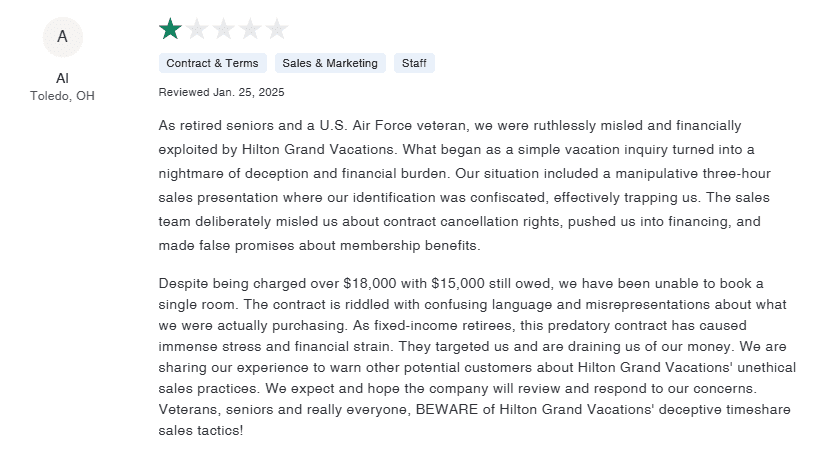
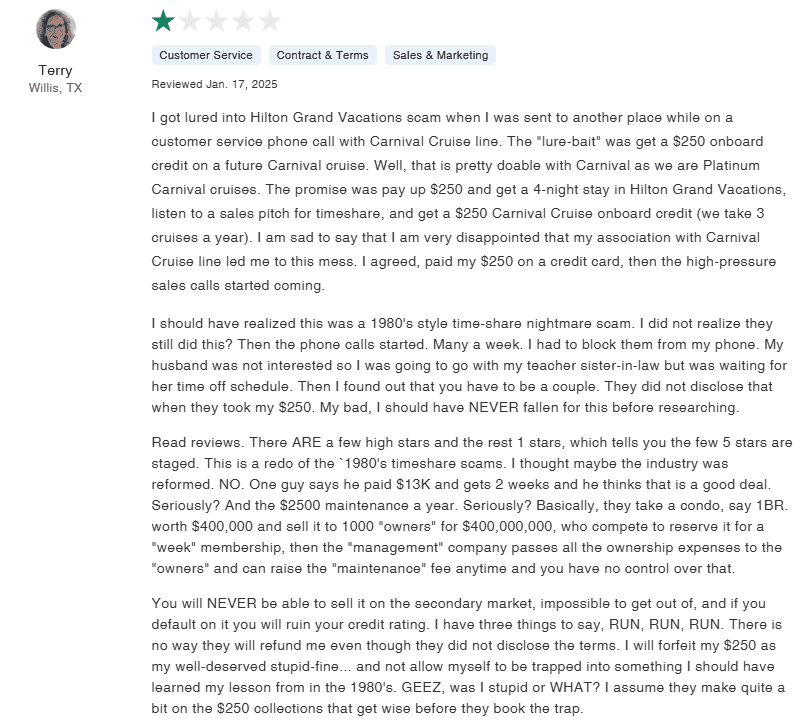
3. The Booking Nightmares
You’d think that paying for a timeshare would guarantee you a spot at your chosen resort. Not necessarily.
Many HGV owners struggle with availability, especially during peak travel seasons. Even with their "flexible" points system, securing a booking can feel like winning the lottery. And if you’re paying thousands in fees for the privilege of fighting for vacation slots, it hardly seems worth it.
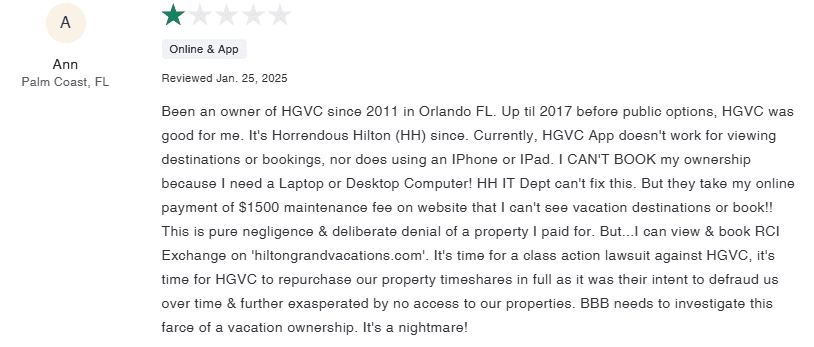
4. Labor Strikes and Legal Trouble
Beyond the direct frustrations of timeshare ownership, Hilton has had its fair share of controversies that affect guests.
- Labor Disputes: The Hilton Hawaiian Village Waikiki Beach Resort saw around 2,000 union workers strike in 2024, demanding higher wages and better conditions. This directly impacted the service and experience of paying guests.
- Lawsuits and Scandals: From price-fixing allegations to a shocking negligence verdict where a guest was placed in the wrong room and assaulted, Hilton has been in hot water more than a few times.
These issues raise serious questions about how Hilton operates—not just in timeshares but across their entire brand.
Real Owners, Real Complaints
If you think you’re alone in regretting your Hilton timeshare purchase, think again. Here are some real complaints from HGV owners:
- Myrtle Beach, South Carolina: One guest called their timeshare presentation a "total scam" and had to hire a company to get them out of the contract.
- Hilton Cancun, Mexico: A reviewer cited safety concerns and called their stay the "worst resort experience" ever.
- Hilton Grand Vacations Club Tuscany Village, Orlando: Another owner described their timeshare presentation as a "SCAM," warning others to avoid it at all costs.
- Hilton Waikoloa Village, Hawaii: One guest left a blunt review: "STAY AWAY FROM THE TIMESHARE SCAM."



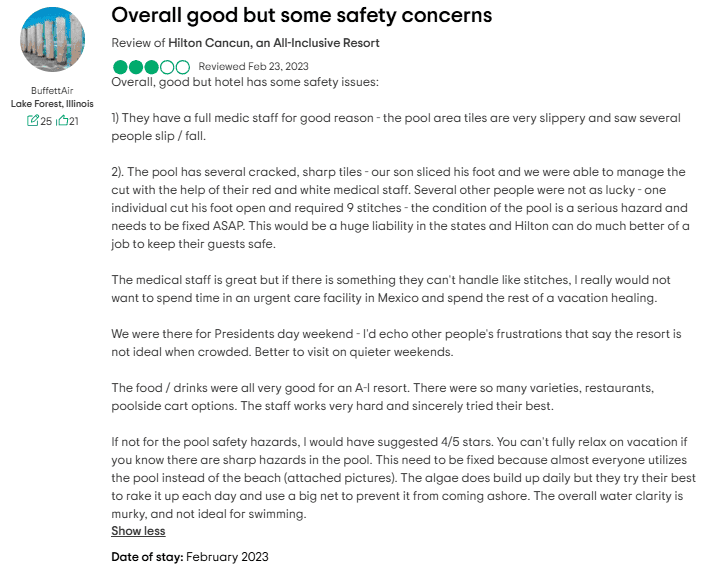
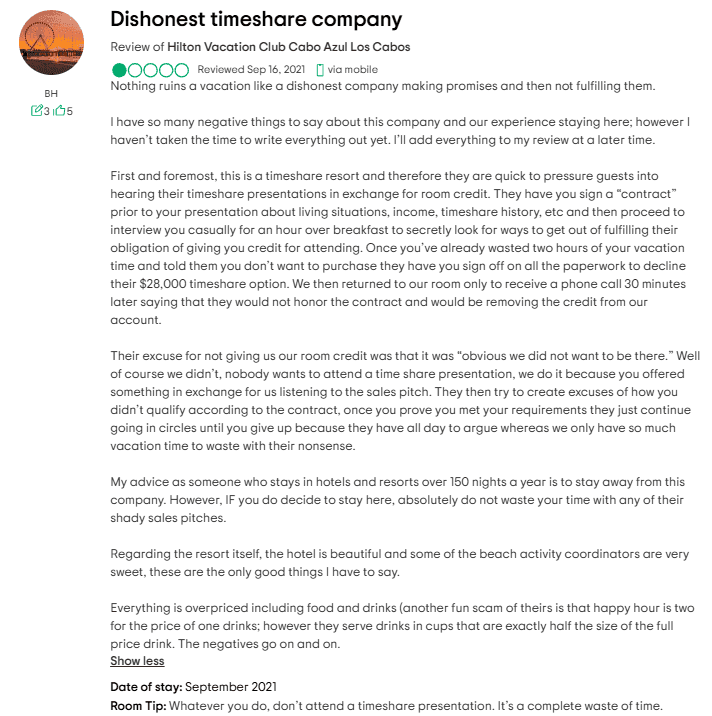
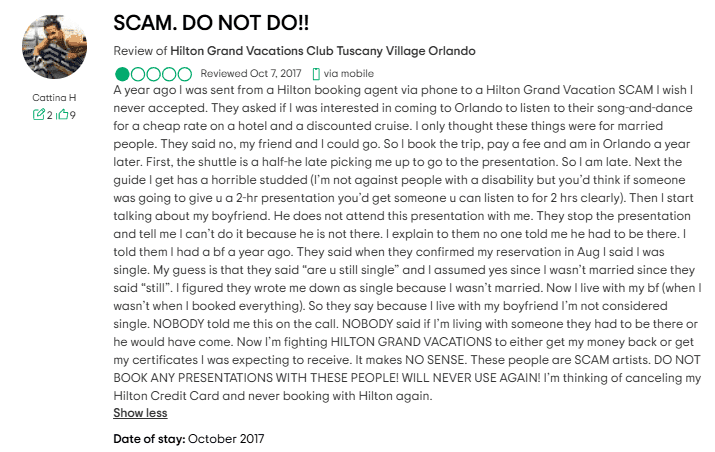
These are just a handful of examples, but they paint a clear picture—buyers remorse is very real in the world of Hilton timeshares.
How to Escape Your Hilton Timeshare
If you’ve had enough and want out, there are a few ways to approach your exit strategy:
- Rescission Period: If you’re still within the legal timeframe (varies by state and country), you can cancel your contract without penalty.
- Sell or Transfer Your Timeshare: While the resale market is tough, some owners have luck selling or transferring their timeshare to another buyer.
- Hilton’s Surrender Program: Hilton offers a limited exit program called "Hilton Grand Vacations Exit," but eligibility is strict, and not everyone qualifies.
- Hire a Timeshare Exit Company: If you’re struggling to get out on your own, a reputable timeshare exit company can help you navigate the process legally and effectively.
Final Thoughts
Hilton Hotels & Resorts might be a global hospitality powerhouse, but their timeshare division comes with serious baggage. Between high-pressure sales tactics, skyrocketing fees, and poor customer experiences, many owners find themselves stuck in a deal they no longer want.
If you’re considering a Hilton timeshare exit, know that you have options. Whether through a resale, surrender program, or professional help, there are ways to free yourself from the never-ending cycle of fees and frustration.
Thinking about leaving Hilton Grand Vacations behind? You’re not alone. And the sooner you start exploring your exit options, the better.
Need help finding a trustworthy timeshare exit company? Do your research, ask for references, and beware of scams—because the last thing you need is another bad deal.


